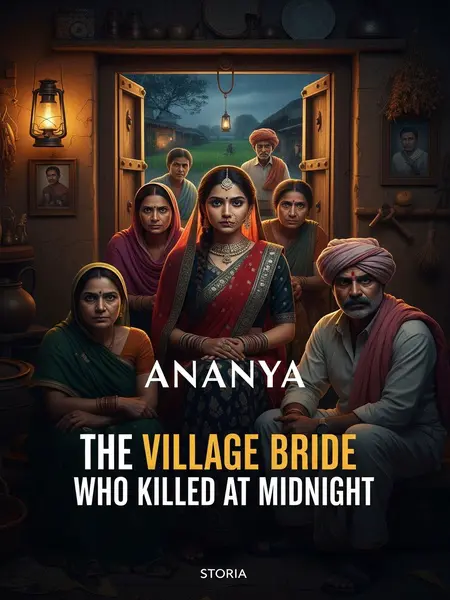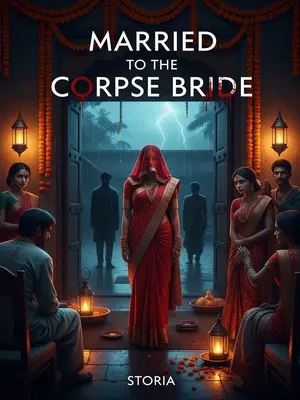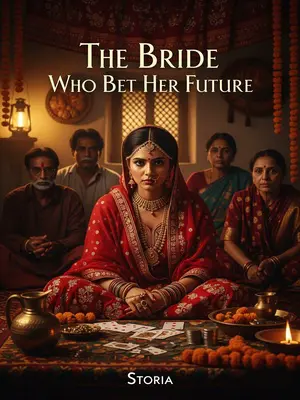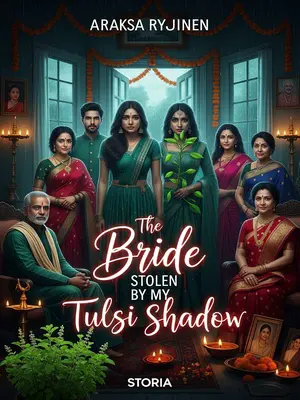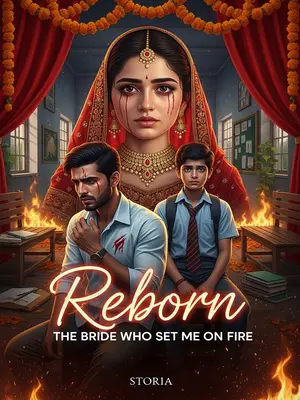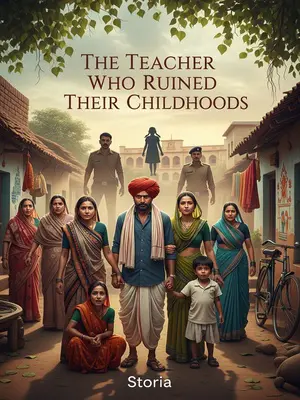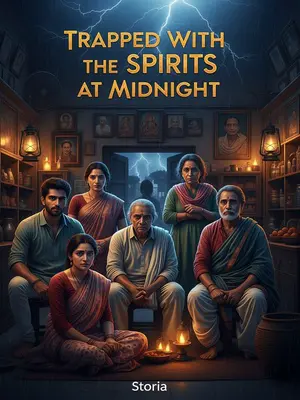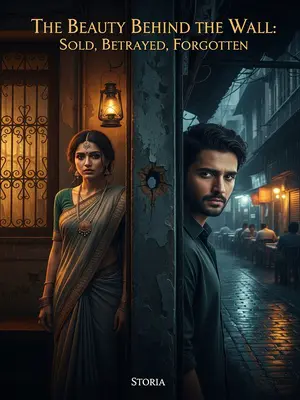Chapter 2: Poison and Retribution
According to Rohan, he had been pressured by his parents repeatedly before finally taking leave to return home.
It was the usual story: parents dreaming of a suitable match, the older brother growing older by the day, and the younger son—educated and full of dreams—caught in the middle. Rohan’s letters home had been full of excuses, but finally, guilt and duty brought him back.
Bringing his girlfriend Ananya was also at his parents’ urging.
He had resisted, knowing small villages can be cruel to outsiders, especially a girl from a different background. But his parents insisted, “Beta, shaadi ka time aa gaya hai. At least let us see the girl.”
Because, as Rohan said, after graduation he would definitely find work with Ananya in the city—it was impossible for him to return to the hills.
He saw his future among computers and busy streets, not in the quiet loneliness of terraced fields. His heart was already in Pune, with Ananya, with hopes of a modern life.
That’s why he brought Ananya home this time. It might be their only chance.
The journey itself was tense, as they changed buses at the dusty stand, carrying their own bags, sweating in the May heat. Rohan kept reassuring her, "Just a few days, yaar. Then we’ll be out of here, promise."
But unexpectedly, disaster struck.
No one could have predicted what was coming. In villages, sometimes even the air feels heavy with secrets, but this—this was something else entirely. Ananya’s face, Rohan remembered, changed from hope to fear in just one night.
After they returned, his parents were very enthusiastic, preparing a lavish meal—biryani, paneer tikka, and even bringing out wine they’d saved for years.
The kitchen was alive with the hiss of the pressure cooker, the aroma of ghee and spices swirling through the house. Rohan’s mother brought out her prized silver plates. There was laughter, forced but loud, and the family seemed almost normal for a moment. Even the neighbours peeked in, their curiosity barely hidden.
Ananya didn’t drink, so Rohan had to drink with his father.
The first glass was offered with pride, the second with expectation. Rohan, never much of a drinker, accepted out of politeness, feeling the weight of his father’s gaze.
But as a young man, he couldn’t match his father’s drinking ability and soon became drunk.
He remembered the room spinning, the old film songs from the transistor radio blurring with his father’s laughter. The last thing he saw was Ananya, sitting stiffly, eyes darting between the brothers, before everything faded.
He only found out the next day what a terrible thing had happened the night before—
The silence in the house was different. The air was tense, as if the walls themselves wanted to scream. Rohan woke with a pounding headache and a sense of dread he couldn’t explain.
Ananya had been thrown by his parents into the room of his elder brother, Arvind.
That one detail sent shivers down our spines. It was an old, rotten cruelty—one that belonged in whispered horror stories, not in real life. Arvind’s room, a small, cluttered place with a single cot and posters of film heroines, became a prison.
This elder brother had always been unruly, never even finishing school, and could only farm at home with their parents.
Villagers had always shaken their heads at Arvind’s ways—quick to anger, fond of drink, never seen at temple. He was the sort of son families whispered about but never disowned.
Now, nearly thirty, he still hadn’t started a family.
Kamla would sigh at the temple, “Hamara Arvind toh shaadi ke laayak hi nahi,” her voice thick with helplessness. It was a wound that had festered for years.
When Rohan sobered up, he nearly went mad and tried to fight his parents.
He grabbed his father by the collar, screaming words that echoed through the walls. Neighbours claimed they heard the commotion but dismissed it as a family squabble—everyone in villages fights, after all. But this was different. This was despair.
But unfortunately, his father, just over fifty and still in his prime, had the strength from a lifetime of farm work and subdued Rohan in a few moves.
Farmers’ hands are like iron—years of lifting sacks and breaking soil. Rohan, for all his city learning, was no match. He was pinned down, his anger no use against muscle built on toil.
Seeing him struggle and howl, his mother tried to persuade him:
“Just pity your elder brother. He’ll never be able to marry in this life… You’re different, you’re a university student. When you go out, can’t you marry anyone you want?”
Her words, meant as comfort, felt like poison. In Indian homes, duty and sacrifice are drilled into children from birth, but this was a cruelty beyond words. Rohan’s heart cracked that day, his trust in his parents broken forever.
Of course, Rohan couldn’t accept this.
He spat back, voice breaking, "Bas karo, Maa! Aap logon ko sharam nahi aayi?" For him, the home was no longer a refuge. The family honor—izzat—was gone, replaced by disgust.
So his father threw him into the storage room out back and locked the door, delivering food daily.
The tiny storeroom, dark and airless, had only a gunny sack for a bed and the sharp smell of pesticides. Each meal was thrust in through a gap in the door, no words spoken. In those days, locking up a disobedient son wasn’t unheard of, but this—this was solitary confinement.
Until two days ago, when suddenly no one brought food anymore.
At first, he thought it was just punishment, a test. But as the hours dragged, hunger gnawed at his insides. The sounds of the house fell silent. Even the crows seemed to avoid the roof.
He went hungry for two days and nights before we rescued him…
When we finally opened the door, he was a shadow of himself, eyes wild and desperate, like a man who’d stared too long at the darkness.
So when he heard about his family’s murder, he showed no sadness at all.
Not a single tear. Instead, he sat staring at his hands, as if seeing the blood that should have been his family’s but wasn’t. When the police asked, Rohan stared at them, his eyes hollow, and muttered, "Ghar toh kab ka jal gaya tha, saab. Ab bas raakh bachi hai."
Because the killer truly had a reason.
For the first time, we questioned the simple stories we’d grown up with. In Indian homes, where family is everything, what happens when family becomes your jailer?
So the question arose:
Each man in the chowki asked the same thing, some aloud, others with just a shake of their heads.
Could Ananya really have killed all three?
In every bazaar and chai tapri, people debated: a girl like her? Educated, soft-spoken? "Nahi yaar, aurat aisa kaise kar sakti hai?" Yet, the evidence pulled us in another direction.
A gentle university student—how could she possibly kill three strong farmers?
It was the heart of the matter. In a country where women are often seen as weak, fragile, the possibility itself was disturbing. But we had no answers. Only more questions.
So at first, Inspector Prakash ordered us: “Treat Ananya as a missing victim. Find her and protect her before anything else.”
Prakash Sir was a thoughtful man, always pausing before he spoke. “Beti hai woh, pehle usey dhundo. Kya pata, bechari kahaan chali gayi ho.” He assigned half the force to comb the fields and nearby bus stops. We sent her photo to the local WhatsApp group—no one had seen her.
But soon, we almost had to overturn this conclusion.
The days grew hotter, tempers shorter. New evidence was about to change everything, as it often does in Indian villages—where truth hides beneath layers of dust and rumour.
Ananya was definitely not just a victim.
The realization hit us like a slap. Suddenly, the entire picture shifted. Could a victim turn into an avenger? The thought sent a shiver down our spines.
Because our colleagues found some evidence.
It was in the kitchen, that most sacred of Indian spaces—where mothers pray over dal, and secrets are stirred into chai. Here, in the very heart of the home, lay the key.
First, in the kitchen, we found traces of bottled organophosphate pesticide—malathion.
Almost every home kept a bottle of pesticide for the wheat harvest, the bitter chemical stashed next to pickles and spare bulbs. But here, the bottle was missing its cap, and the tablecloth was stained a sickly yellow.
This is a common pesticide with strong neurotoxicity. Inhalation quickly causes dizziness, headaches, nausea, vomiting, excessive sweating, blurred vision, pinpoint pupils, and in severe cases, muscle tremors, convulsions, muscle weakness, even fatal respiratory paralysis.
Our medical officer explained in a low tone, “Sir, isse toh aadmi pal mein gir jata hai.” The symptoms were ghastly—far worse than any snakebite. Everyone stared at the half-empty bottle, trying to imagine what horrors had taken place.
This alone wasn’t enough to prove Ananya was the killer.
People tried to reason—maybe someone else used it, maybe it was an accident. But in our hearts, doubt had taken root.
But at the same time, we found another glass bottle containing purified malathion solution.
This second bottle was different—clear, almost innocent. A trained eye could tell it was not ordinary farm stock. Someone had gone to a lot of trouble.
As is well known, malathion has a foul odour and ordinary people wouldn’t easily ingest it. But after purification, it becomes colourless, odourless, and easily soluble in water.
No villager would ever make that mistake. But someone who understood chemistry—someone with a university education—just might.
Additionally, a colleague found a simple evaporation-condensation device made from discarded glass bottles in the kitchen corner.
It was a small, crude contraption, but ingenious. The sort of thing a student might build for a science fair. It was tucked away behind sacks of onions, hidden but not well enough.
To be honest, in that era, only educated people who had attended university could make such a thing.
Inspector Prakash nodded slowly. “Yeh toh padhe likhe ka kaam hai.” The villagers who crowded behind the police cordon stared in awe, never having seen such a device.
From this, we could even deduce how Ananya committed the crime—
We could picture her, hands steady, eyes focused, as she worked late into the night. Maybe her heart pounded with fear, or maybe it was numb from everything she’d endured.
She pretended to give in, acting as if she had accepted her fate and started serving the family.
Neighbours recalled seeing her sweeping the courtyard, fetching water from the well. She did everything Kamla asked, never raising her voice, never protesting. The village women gossiped that she was finally becoming a good bahu.
After several days of living together, the family believed she had truly submitted.
They let their guard down, calling relatives to say the girl was now as good as married. Even Arvind, for the first time, was seen whistling old songs as he tilled the land.
Then, she began using the household pesticide to concoct a deadly, tasteless poison and put it in their food.
A little mixed with dal, a little with the mutton curry. The same hands that had learned to cook from her mother in the city now worked in silence, every move deliberate.
After the three members of the family ate the poisoned food and lost the ability to resist…
They staggered, clutching their throats, eyes rolling. The oldest neighbor said he heard strange noises that night—unearthly, broken cries. But he thought it was just the usual family drama.
She picked up a kitchen knife and slaughtered them all.
The very knife Kamla once used to cut mangoes for her children now turned into an instrument of vengeance. By morning, the house was a tomb.
It must be said, this was probably the most reasonable explanation.
Even Inspector Prakash, with all his years of experience, shook his head, “Aise case maine pehli baar dekha hai.” It was so perfectly executed, so cold, that even our most senior officers had no words.
Only this method could have allowed the three robust members of the family to be killed without resistance.
Otherwise, not even two men could have handled the father, let alone the wild Arvind. Only poison could have done the job.
Inspector Prakash had to change his view and admit that Ananya was the primary suspect.
His face was grim as he made the entry in the case diary. “Ananya: principal accused.” Even so, a part of him still doubted—could a girl like that truly be so ruthless?
But whether she was a suspect or a victim, finding her was the most urgent matter.
The entire chowki was mobilised, even the new recruits. In villages like ours, when a girl goes missing, the ground itself seems to close over her.
However, in these deep hills and forests, finding someone was no easy task.
The jungles around Gopalpur are thick, full of wild dogs and the occasional leopard. Local boys were sent with lathis, searching every nala and cave.
So we never expected—
We checked every bus stop, every bullock cart heading for the highway. Nothing. She had simply vanished, like mist after sunrise.
She hadn’t fled into the hills.
Inspector Prakash frowned, “If she’s not in the jungle, toh hai kahaan?” Suspicion began to fall on the villagers themselves—was someone sheltering her?
She was still hiding in that complicated village.
It was a terrifying thought. No one trusted anyone. Doors were bolted, windows shut, and children were kept indoors, away from the ancient peepal tree where they usually played cricket.
Because that night, another major event occurred—
Just when we thought things couldn’t get worse, the village was shaken again. The chowk buzzed with fear; you could hear the sound of bangles trembling as women whispered behind closed doors.
The family’s neighbours—the same family who reported the case—also became victims.
It was as if the evil that had come into the village would not rest until everyone had paid a price. The news spread like wildfire. This time, there were no doubts—murder had struck again.
This family, surnamed Lal, consisted only of an elderly couple, both over fifty.
The Lals were well-known, the kind who handed out sweets at Holi and lent their bullock for weddings. Their absence left a hole in the very fabric of the village.
They had a son and daughter who worked elsewhere and only returned for Diwali.
When word reached their children, a wail went up that could be heard all the way to the schoolhouse. The son arrived by the midnight bus, face ashen, refusing to believe his parents were gone.
The deaths of the Lal couple were even more horrific than those of the first family.
The constable who entered first stumbled out, retching. The bed was soaked with blood, the air thick with death. Not even the old lantern on the bedside table could pierce the darkness of what had happened there.
While they slept, their heads were smashed with a blunt object.
It was a violence so intimate, so close, that the very walls seemed to shrink away. The neighbors, already shaken, now began to suspect each other.
Unke sir usi tarah phut gaye jaise haat ke bazaar mein tarbooz gir jaata hai.
Everyone in the village had seen watermelons break on the dirt at the weekly haat—never had they imagined human heads could be split open in the same way.
There was nothing left that resembled a human face.
Even the local pandit refused to perform the last rites at first. “Yeh toh ab pehchane jaane layak hi nahi hai.”
We quickly determined—
There were still blood trails leading out the back, as if the killer had left in no hurry at all. The neighbours gathered outside, murmuring prayers under their breath, some clutching their sacred threads.
The killer had likely used a wooden stick with a stone tied to it as the murder weapon.
One of the constables found it discarded behind the cowshed—a makeshift gada, the sort you’d see in mythological serials. No one claimed to have seen it before.
But their deaths raised even more questions.
How could this have happened again, so soon, and with such rage? Was it still the work of Ananya, or was there someone else lurking in the shadows?
If the killer was still Ananya, why would she murder the neighbours?
The Lals were not involved in the earlier incident, so what grudge could she possibly hold against them? Or was there a darker secret binding these two families?
If it wasn’t her, could there be another murderer?
This was the question that kept us up all night, the monsoon wind rattling the wooden shutters as we argued by lantern light.
Because another crucial question resurfaced—
We gathered around the old police register, our faces drawn with fatigue and dread. Was it really possible for Ananya, after everything she had been through, to have done this?
Ananya was a frail young woman. After enduring days of captivity and abuse, did she even have the strength to kill people in such a brutal way?
For the first time, we began to doubt the very evidence we had gathered. The mind can do strange things under pressure, but the body has its limits.
But as dawn broke over Gopalpur, the pressure cooker’s whistle pierced the silence, and someone drew water from the handpump outside. The village was waking up, but its nightmares were far from over.
